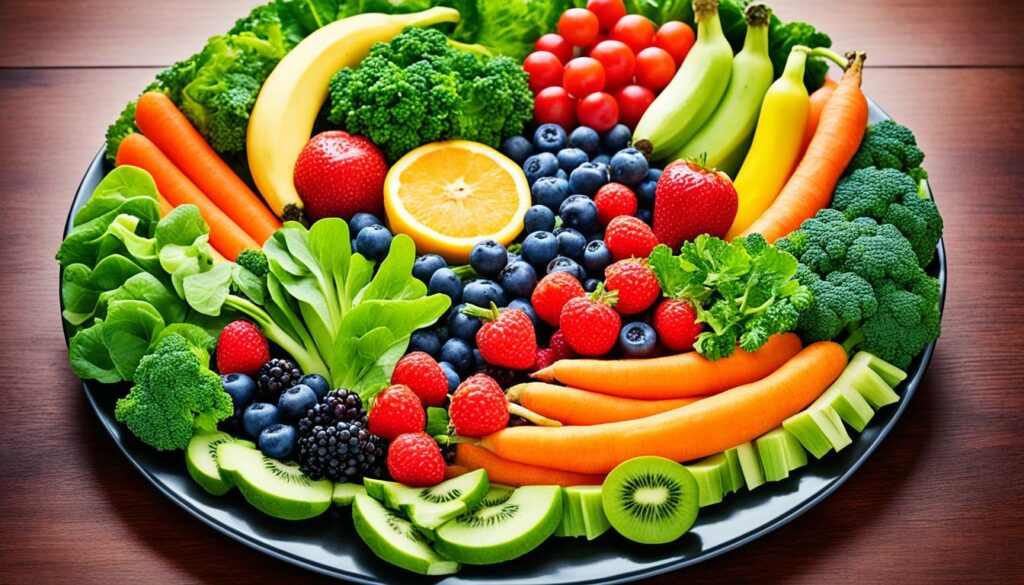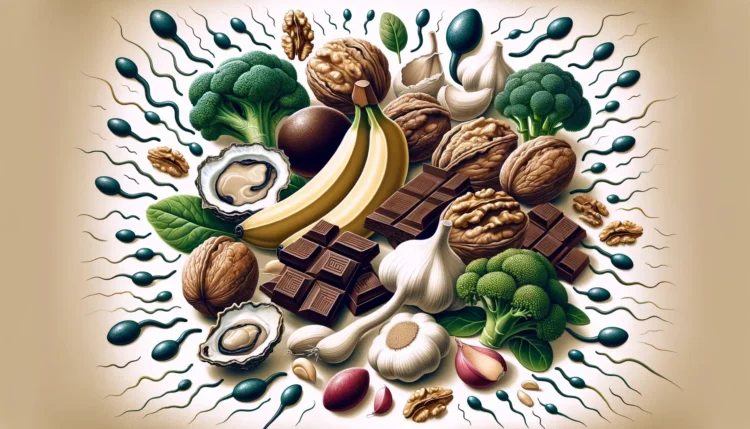Sperm quality and count have been declining over the past few decades, making it harder for couples to conceive. Various factors, including nutrition, can affect sperm health.
In a recent study, it was found that average sperm counts have dropped by 59 percent over the past 38 years. This decline, combined with the trend of having children later in life, has led to increased difficulties with fertility.
While the exact causes of declining sperm counts are still unclear, certain foods have been identified as potential contributors to poor sperm health. On the other hand, there are also foods that can help increase sperm count and improve overall fertility.
Key Takeaways:
- Declining sperm counts have become a concerning issue, with average sperm counts dropping by 59 percent over the past 38 years.
- Nutrition plays a crucial role in sperm health, and certain foods can negatively affect sperm count and motility.
- However, there are foods that can help increase sperm count and improve fertility.
- By incorporating fertility-boosting foods into your diet, you can optimize sperm production and increase your chances of conceiving.
- Certain nutrients, such as CoQ10 and garlic, have been shown to positively impact sperm count.
Foods to Avoid for Sperm Health
Certain foods have been associated with decreased sperm counts and poor sperm health. It is important to be mindful of these foods and limit their consumption in order to promote optimal fertility. Let’s take a closer look at some of the foods that can have a negative impact on sperm health:
1. Processed Meats
Processed meats, such as hot dogs and bacon, have been linked to decreased sperm counts and altered sperm motility. These meats contain additives and preservatives that may contribute to these negative effects.
2. Trans Fats
Trans fats, commonly found in fried junk food, can also negatively impact sperm counts. These fats can lead to inflammation and oxidative stress in the body, which can compromise sperm health and fertility.
3. Soy Products
Excessive consumption of soy products has been shown to decrease sperm concentration. Soy contains a high level of phytoestrogens, which are known to have estrogen-like effects in the body. This can disrupt hormone balance and potentially decrease sperm production.
4. Pesticides
Pesticides are commonly used on fruits, vegetables, meat, and fish to control pests. However, exposure to these chemicals can act as xenoestrogens in the body, disrupting the natural hormone balance and potentially decreasing sperm concentration.
5. Bisphenol A (BPA)
Bisphenol A (BPA) is a chemical compound commonly found in food packaging, such as plastic containers and cans. It has been shown to have negative effects on sperm concentration. Avoiding food containers and packaging that contain BPA can help protect sperm health.
6. High-Fat Dairy Products
High-fat dairy products, such as whole milk and cheese, have been associated with decreased sperm motility and abnormal sperm shape. It is recommended to opt for low-fat or non-dairy alternatives to support sperm health.
By avoiding or limiting the consumption of these foods, men can take proactive steps towards improving their sperm health and promoting fertility.

Foods to Avoid for Sperm Health
| Food | Impact on Sperm Health |
|---|---|
| Processed Meats | Decreased sperm counts and altered motility |
| Trans Fats | Negative impact on sperm counts |
| Soy Products | Decreased sperm concentration |
| Pesticides | Disruption of sperm concentration |
| Bisphenol A (BPA) | Negative effects on sperm concentration |
| High-Fat Dairy Products | Decreased sperm motility and abnormal shape |
Foods to Increase Sperm Count
While some foods can negatively impact sperm health, there are also foods that may help increase sperm count and improve overall fertility. Incorporating these fertility-boosting foods into your diet can potentially enhance your reproductive health.
Fish
Consuming fish, especially those high in omega-3 fatty acids like salmon and sardines, has been associated with better sperm motility. Omega-3 fatty acids are known to improve blood flow and reduce inflammation, which can positively impact sperm production and quality.
Fruits and Vegetables
Including a variety of fruits and vegetables in your diet, especially green leafy vegetables like spinach and kale, as well as beans and legumes, can increase sperm concentrations and improve sperm motility.
These foods are rich in essential vitamins, minerals, and antioxidants that support optimal sperm production and function.
Walnuts
Adding walnuts to your diet can have beneficial effects on sperm vitality. Walnuts are rich in omega-3 fatty acids, antioxidants, and zinc, all of which play a crucial role in maintaining healthy sperm production and function.
To enhance your chances of improving sperm count and fertility, try incorporating these foods into your daily meals. Remember to maintain a balanced diet and make other healthy lifestyle choices to further support your reproductive health.

Other Foods for Sperm Health
In addition to the previously mentioned foods, there are other options that can help improve sperm health and increase sperm count.
Asparagus
Asparagus, known for its high vitamin C content, is beneficial for maintaining sperm quality and quantity.
Dark Chocolate
Dark chocolate, rich in antioxidants and L-arginine HCl, has been linked to higher sperm counts and volume.
Eggs
Eggs, containing protein and protecting sperm from free radicals, can contribute to healthier and stronger sperm cells.
Pumpkin Seeds
Pumpkin seeds, rich in phytosterols, can increase testosterone production and improve sperm count.
Bananas
Bananas, with vitamins A, B1, and C, can promote healthier sperm cells.
Maca Roots
Maca roots, taken as a supplement, can increase sperm counts and fertility.
| Foods | Benefits for Sperm Health |
|---|---|
| Asparagus | High vitamin C content maintains sperm quality and quantity. |
| Dark Chocolate | Rich in antioxidants and L-arginine HCl, linked to higher sperm counts and volume. |
| Eggs | Contain protein and protect sperm from free radicals, contributing to healthier and stronger sperm cells. |
| Pumpkin Seeds | Rich in phytosterols, which increase testosterone production and improve sperm count. |
| Bananas | With vitamins A, B1, and C, promote healthier sperm cells. |
| Maca Roots | Taken as a supplement, increase sperm counts and fertility. |
Additional Foods for Sperm Health
Aside from the previously mentioned foods, there are several other options that have been associated with improved sperm health and increased sperm count. Incorporating these foods into your diet may contribute to better fertility outcomes:
Garlic: Known for its compound allicin, garlic can improve blood flow to male sexual organs, positively impacting sperm counts and semen volume.
Lentils: Rich in protein, fiber, and folate, lentils can help maintain a healthy hormonal balance and increase sperm count.
Avocados: Packed with folate, vitamin E, and zinc, avocados provide essential nutrients for optimal sperm count and motility.
Brazil nuts: High in antioxidants and selenium, Brazil nuts can increase testosterone levels and boost male fertility.
Goji berries: Known to improve mood and potentially create an optimal temperature for sperm production, goji berries are rich in antioxidants and may improve sperm motility and fertility.
Fenugreek: A traditional ingredient in Indian cuisine, fenugreek is believed to increase sperm count and enhance libido.
By incorporating these additional foods into your diet, you may be able to improve sperm health and increase your chances of successful conception.
| Food | Key Nutrients | Potential Benefits |
|---|---|---|
| Garlic | Allicin, antioxidants | Improved blood flow to male sexual organs, increased sperm counts and semen volume |
| Lentils | Protein, fiber, folate | Maintain healthy hormonal balance, increase sperm count |
| Avocados | Folate, vitamin E, zinc | Essential nutrients for optimal sperm count and motility |
| Brazil nuts | Antioxidants, selenium | Increase testosterone levels, boost male fertility |
| Goji berries | Antioxidants | Improve sperm motility and fertility, potentially create optimal temperature for sperm production |
| Fenugreek | — | Increase sperm count, enhance libido |
Conclusion
Maintaining a healthy diet can play a significant role in improving sperm count and overall fertility. By avoiding processed meats and trans fats, men can protect their sperm health.
To enhance sperm count and motility, it is crucial to incorporate nutrient-rich foods into the diet, such as fish, fruits, vegetables, nuts, and seeds. These foods provide essential vitamins, minerals, and antioxidants that support optimal sperm production and motility.
However, diet alone is not enough. Men should also strive to maintain a balanced diet, avoid smoking, and achieve a healthy weight to further enhance sperm health. These lifestyle changes can have a positive impact on fertility by improving sperm quality and increasing the chances of successful conception.
In conclusion, making dietary and lifestyle adjustments can help men optimize their fertility and increase their chances of conceiving. By embracing a sperm-friendly diet and adopting healthy habits, men can take proactive steps toward improving their overall reproductive health.
Remember, a balanced and nutritious diet is key to supporting optimal sperm count, motility, and fertility.
FAQ
What are the best foods to increase sperm count?
Some of the best foods to increase sperm count include fish, fruits and vegetables, and walnuts.
Which foods should be avoided for sperm health?
Processed meats, trans fats, soy products, pesticides, bisphenol A (BPA), and high-fat dairy products should be avoided for sperm health.
How does fish help increase sperm count?
Fish, particularly those high in omega-3 fatty acids, have been associated with better sperm motility, which helps increase sperm count.
Which fruits and vegetables are beneficial for sperm count?
Consuming higher amounts of fruits and vegetables, especially green leafy vegetables and beans, has been shown to increase sperm concentrations and improve sperm motility.
How do walnuts improve sperm count?
Walnuts, rich in omega-3 fatty acids, antioxidants, and zinc, have been found to improve sperm vitality, ultimately contributing to an increase in sperm count.
What other foods can improve sperm health?
Other foods that can improve sperm health include asparagus, dark chocolate, eggs, pumpkin seeds, bananas, and maca roots.
How does garlic help increase sperm count?
Garlic, known for its compound allicin, can improve blood flow to male sexual organs and positively impact sperm counts and semen volume.
How do lentils contribute to sperm count?
Lentils, rich in protein, fiber, and folate, can help maintain a healthy hormonal balance and increase sperm count.
What benefits do avocados provide for sperm count?
Avocados, packed with folate, vitamin E, and zinc, can provide essential nutrients for optimal sperm count and motility.
How do Brazil nuts help boost sperm count?
Brazil nuts, high in antioxidants and selenium, can increase testosterone levels and boost male fertility.
Do goji berries improve sperm count?
Goji berries, known to improve mood and potentially create an optimal temperature for sperm production, are rich in antioxidants and may improve sperm motility and fertility.
Can fenugreek increase sperm count?
Fenugreek, a traditional ingredient in Indian cuisine, is believed to increase sperm count and enhance libido.
What is the conclusion of boosting fertility with food?
By incorporating nutrient-rich foods and maintaining a healthy diet and lifestyle, men can optimize their fertility and increase their chances of successfully conceiving.




